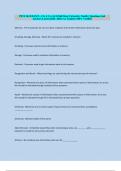Exam (elaborations)
PSYS 363 EXAM 3 - Ch. 4, 5, 6, & 8 (Ball State University, Nardi) | Questions And Answers Latest {} A+ Graded | 100% Verified
- Course
- Institution
PSYS 363 EXAM 3 - Ch. 4, 5, 6, & 8 (Ball State University, Nardi) | Questions And Answers Latest {} A+ Graded | 100% Verified
[Show more]



